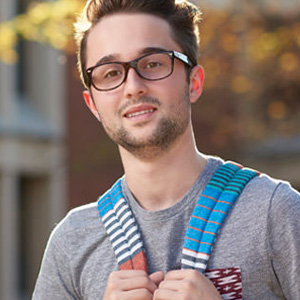Bring Medical Imaging to Life as an Ultrasound Technician
The diagnostic medical sonography (DMS) certificate of proficiency (CP) provides the skills needed for careers in ultrasound and medical imaging. You’ll learn how to work with patients, keep accurate medical records and perform sonographic exams in clinical settings. By the end of the program, you’ll be prepared to pursue certification exams through the American Registry for Diagnostic Medical Sonography (ARDMS) and begin working in a variety of health care environments.
The program offers three areas of focus: general (medical), cardiac and vascular sonography. Each option is completed separately, allowing you to choose the path that best fits your interests and career goals.
This program has special admission requirements. Please review the requirements checklist before submitting your application.
What is Diagnostic Medical Sonography at St. Louis Community College?
Diagnostic medical sonography, also called ultrasound technology, uses sound waves to create images of the body. These images help doctors find and monitor medical conditions. At STLCC, you’ll learn how to use ultrasound equipment, work with patients and perform imaging exams in clinical settings.
The program's goal is to prepare you for entry-level sonographer roles. You’ll build the knowledge, hands-on skills and professional behaviors needed to work safely and effectively in clinical settings.
Students are prepared for the following areas of focus:
- Abdominal-extended sonography
- Obstetrics and gynecology sonography
- Vascular sonography
- Adult cardiac sonography

What Can You Do with a DMS Certificate?
Earning a DMS certificate prepares you to pursue professional credentials and move into ultrasound and medical imaging roles. Depending on your area of focus, graduates may be eligible to take ARDMS certification exams.
Eligible certification exams may include:
- Registered Diagnostic Medical Sonographer (RDMS) in Abdomen and Obstetrics and Gynecology
- Registered Diagnostic Cardiac Sonographer (RDCS) in Adult Echocardiography
- Registered Vascular Sonographer (RVT)
The program is designed to support readiness for entry-level sonographer work across abdominal-extended, obstetrics and gynecology, adult cardiac and vascular sonography settings.
CP in Diagnostic Medical Sonography
- Degree offered: Certificate of proficiency
- Locations: Forest Park (Medical, cardiac and vascular), Wildwood (Medical and cardiac only)
- Hours to complete: 43
- Program contact name: Lauren Pellegrini, MHA, RDMS, RVT, RDCS
- Program contact email: dmsprogram@stlcc.edu
- Accreditation:
Commission on Accreditation of Allied Health Education Programs (CAAHEP) upon the recommendation of the Joint Review Committee on Education in Diagnostic Medical Sonography (JRC-DMS).
Commission on Accreditation of Allied Health Education Programs
9355-113th St. N, #7709
Seminole, FL 33775
Phone: 727-210-2350
Fax: 727-210-2354 - This program meets the educational requirements for state licensure in the following states: Missouri and Illinois. Students interested in pursuing licensure in a different state should contact the program coordinator for more information.
Additional Information
- Current CPR health care provider-level certification is required by the first day of class and must be maintained throughout the program.
- The hospitals used as clinical sites for the program and board examinations require a criminal background check and drug screening. Should the background check reveal prior felony criminal convictions, the hospital will be contacted to determine if the student is disqualified. If the drug screen is positive, the student will not be permitted to participate in any clinical rotation or internship.
Tuition for district residents is $122 per credit hour for in-district students. Find out more about our straightforward and low-cost tuition structure.
Admission Requirements
- An associate degree from an accredited institution
- Completion of all program prerequisites prior to submitting an application. Must earn
a “C” or higher in the following courses:
- Anatomy and Physiology I w/ Lab (BIO 207) and Anatomy and Physiology II w/ Lab (BIO 208)
- College Physics I (PHY 111) or Physical Science (PSI 101)
- Precalculus Algebra (MTH 160 or MTH 160S) or Introductory Statistics (MTH 180 or MTH 180S)
- Medical Terminology (HIM 101)
- College Composition (ENG 101)
- Oral Communication (COM 101) or Public Speaking (COM 107)
- Cumulative GPA: 3.0 or higher across all colleges attended or across the most recent 45 credit hours
- Cumulative GPA for math and sciences: 3.0 or higher in physics, anatomy and physiology, precalculus algebra or introductory statistics
- Only one repeat of a prerequisite course is allowed over a five-year period
- Complete four hours of job shadowing in a sonography department
- Work 40 hours in a patient care setting, which can be voluntary service within a hospital or nursing home
- Math and science prerequisite courses must have been completed within five years of applying to the program
- Students who have graduated within the last two years from a JRCERT accredited Radiologic Technology program are not required to retake math or science courses that are more than five years old. View full details: Diagnostic Medical Sonography Program Admissions Requirements
Program Goals
At the completion of the program (general concentration), students are expected to:
- Perform sonographic examinations of the abdomen, superficial structures, non-cardiac chest and the gravid and nongravid pelvis.
- Identify the sonographic appearance of normal anatomic structures, including anatomic variants and normal Doppler patterns with vascular introduction.
- Identify and appropriately document the abnormal sonographic and Doppler patterns of disease processes, pathology and pathophysiology of the abdomen, superficial structures, non-cardiac chest, and gravid and nongravid pelvis.
- Discuss basic principles in ultrasound, vascular ultrasound and ultrasound physics and instrumentation.
- Identify sectional anatomy, hemodynamics, pathophysiologic principles and pattern recognition as it relates to vascular sonography.
At the completion of the program (cardiac concentration), students are expected to:
- Demonstrate proficiency in the performance of M-mode, two-dimensional and Doppler (pulsed wave, continuous wave, color flow and power) echocardiographic studies.
- Identify the sonographic appearance of normal cardiac anatomy, including anatomic variants and normal Doppler patterns with vascular introduction.
- Identify and appropriately document the abnormal sonographic and Doppler patterns of cardiac disease, processes, pathology and pathophysiology.
- Discuss basic principles in ultrasound, vascular ultrasound and ultrasound physics and instrumentation.
- Identify sectional anatomy, hemodynamics, pathophysiologic principles and pattern recognition as it relates to vascular sonography.
At the completion of the program (vascular concentration), students are expected to:
- Identify sectional anatomy, hemodynamics, pathophysiologic principles, and pattern recognition as it relates to vascular sonography.
- Identify the sonographic appearance of normal vascular anatomy, including anatomic variants, and normal Doppler patterns
- Document the abnormal sonographic and Doppler patterns of vascular disease processes, pathology, and pathophysiology.
- Perform sonographic examinations of the vascular system including anatomical variants, hemodynamics, Doppler patterns, and pathology recognition.
Program Outcomes
Program Effectiveness Data
Why You Should Choose STLCC's Sonography Certificate Program

Graduate With Little or No Debt
We believe cost should never be a barrier to achieving your potential. Save over $4700 per year with tuition that's one-third lower than other local institutions.

Ramp Up High-Wage Skills
STLCC offers career-focused programs for high-wage, high-skill and in-demand jobs. STLCC provides opportunities for college transfers, career development and workforce training.

Build Skills You Need With Stackable Credentials
Stackable credentials help students level up career opportunities without investing a large amount of time and resources. Students can stack or assemble a series of traditional and nontraditional credentials including degrees, certificates, apprenticeships and more.

Caring for Students
STLCC goes beyond academics with support services, ranging from stress and anxiety management to grants for childcare, emergency crisis support, clothing and free meals through Archers' Market and Brown Bag Cafe food pantry. We offer free tutoring on campus or online.
STLCC. What's your reason?